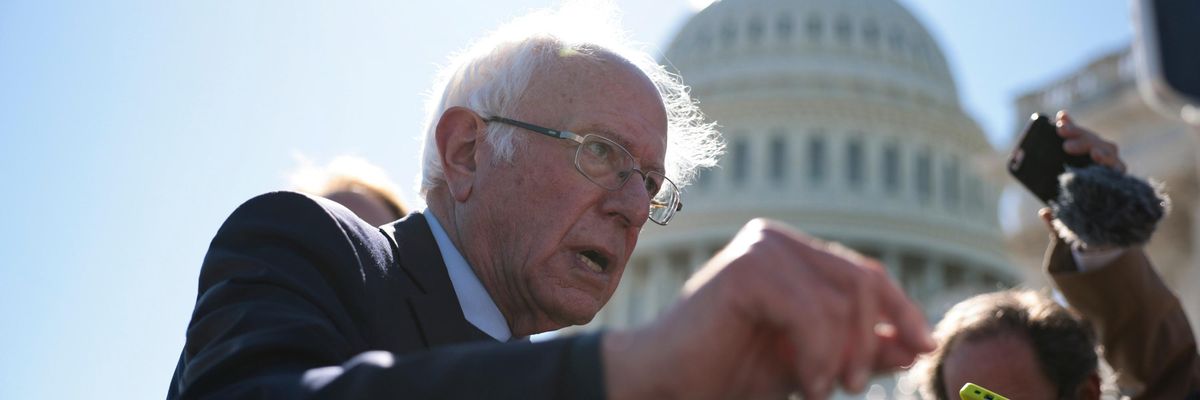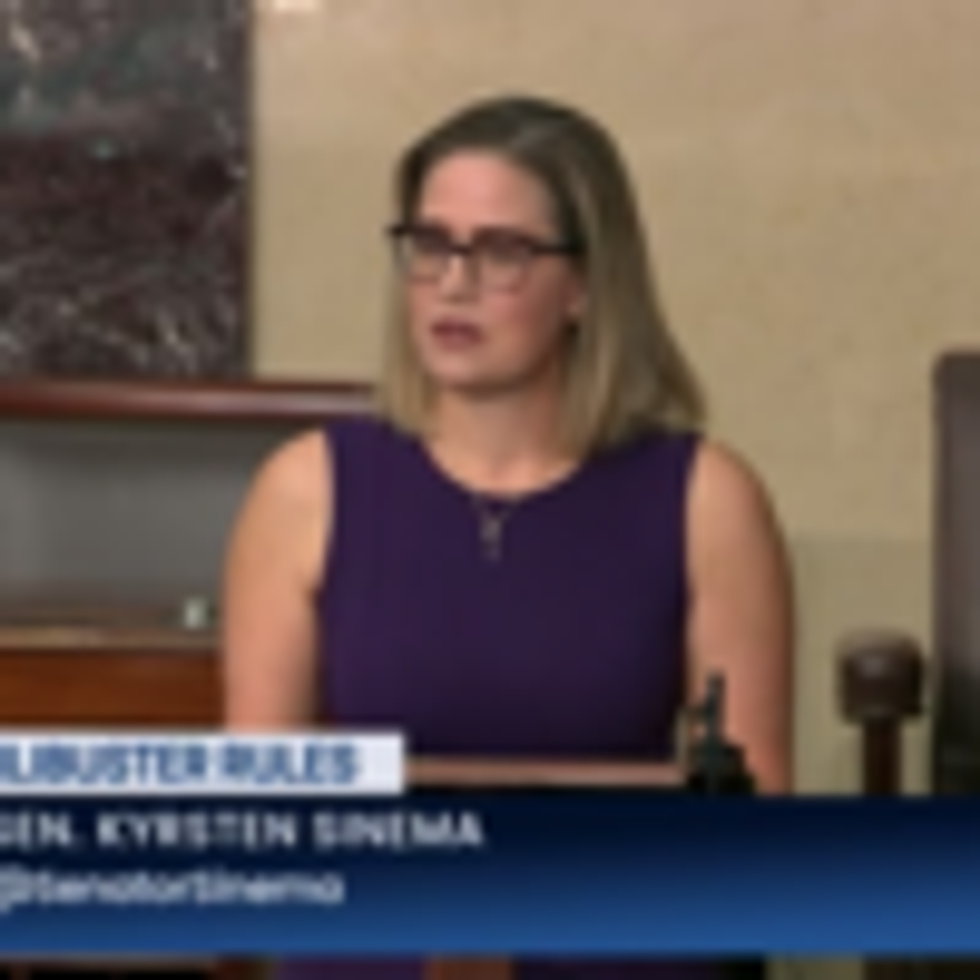

SUBSCRIBE TO OUR FREE NEWSLETTER
Daily news & progressive opinion—funded by the people, not the corporations—delivered straight to your inbox.
5
#000000
#FFFFFF
To donate by check, phone, or other method, see our More Ways to Give page.


Daily news & progressive opinion—funded by the people, not the corporations—delivered straight to your inbox.

Sen. Bernie Sanders (I-Vt.) speaks with reporters as he leaves the U.S. Capitol building on October 21, 2021 in Washington, D.C. (Photo: Anna Moneymaker/Getty Images)
Sen. Bernie Sanders said Friday that by vowing to uphold the archaic Senate rule standing in the way of voting rights legislation, his colleagues Joe Manchin and Kyrsten Sinema are putting "the future of American democracy" at risk.
"It is a sad day when two members of the Democratic caucus are prepared to allow the Freedom to Vote Act to fail," the Vermont senator tweeted. "I hope very much they will reconsider their positions."
Sinema (D-Ariz.) and Manchin's (D-W.Va.) opposition to weakening the 60-vote filibuster rule--a stance they reiterated Thursday--effectively tanks their party's hopes of passing voting rights legislation to thwart the GOP's mass disenfranchisement and election subversion efforts in states across the country.
Despite the likelihood of failure, Majority Leader Chuck Schumer (D-NY.) said the Senate will debate the newly assembled Freedom to Vote: John R. Lewis Act on Tuesday, a day after the federal holiday honoring Martin Luther King Jr.
"If Senate Republicans choose obstruction over protecting the sacred right to vote--as we expect them to--the Senate will consider and vote on changing the Senate rules, as has been done many times before, to allow for passage of voting rights legislation," Schumer said in a floor speech after Sinema made clear she would not back any such changes, intensifying calls for a 2024 primary challenge.
The support of every member of the Senate Democratic caucus and a tie-breaking vote from Vice President Kamala Harris would be needed to enact a rule change.
Related Content

With federal action likely not forthcoming, local Democratic officials and activists "now say they are resigned to having to spend and organize their way around" the slew of fresh Republican-authored voting restrictions, the New York Times reported, "a prospect many view with hard-earned skepticism."
In a July letter to President Joe Biden, a coalition of 150 civil rights organizations wrote that "while we support the notion of a broad-based coalition of advocates, we cannot and should not have to organize our way out of the attacks and restrictions on voting that lawmakers are passing and proposing at the state level."
"Nor can we litigate our way out of this threat to democracy," the groups warned. "We must remember that at critical times in our history, one party has been forced to act alone in securing the fundamental democratic rights of American citizens, including Congress' passage of both the 14th and 15th Amendments. Any rule or procedure that functions to stop bills from ever being considered on the floor is not a procedure to promote debate; it is a procedure to promote gridlock."
Dear Common Dreams reader, The U.S. is on a fast track to authoritarianism like nothing I've ever seen. Meanwhile, corporate news outlets are utterly capitulating to Trump, twisting their coverage to avoid drawing his ire while lining up to stuff cash in his pockets. That's why I believe that Common Dreams is doing the best and most consequential reporting that we've ever done. Our small but mighty team is a progressive reporting powerhouse, covering the news every day that the corporate media never will. Our mission has always been simple: To inform. To inspire. And to ignite change for the common good. Now here's the key piece that I want all our readers to understand: None of this would be possible without your financial support. That's not just some fundraising cliche. It's the absolute and literal truth. We don't accept corporate advertising and never will. We don't have a paywall because we don't think people should be blocked from critical news based on their ability to pay. Everything we do is funded by the donations of readers like you. Will you donate now to help power the nonprofit, independent reporting of Common Dreams? Thank you for being a vital member of our community. Together, we can keep independent journalism alive when it’s needed most. - Craig Brown, Co-founder |
Sen. Bernie Sanders said Friday that by vowing to uphold the archaic Senate rule standing in the way of voting rights legislation, his colleagues Joe Manchin and Kyrsten Sinema are putting "the future of American democracy" at risk.
"It is a sad day when two members of the Democratic caucus are prepared to allow the Freedom to Vote Act to fail," the Vermont senator tweeted. "I hope very much they will reconsider their positions."
Sinema (D-Ariz.) and Manchin's (D-W.Va.) opposition to weakening the 60-vote filibuster rule--a stance they reiterated Thursday--effectively tanks their party's hopes of passing voting rights legislation to thwart the GOP's mass disenfranchisement and election subversion efforts in states across the country.
Despite the likelihood of failure, Majority Leader Chuck Schumer (D-NY.) said the Senate will debate the newly assembled Freedom to Vote: John R. Lewis Act on Tuesday, a day after the federal holiday honoring Martin Luther King Jr.
"If Senate Republicans choose obstruction over protecting the sacred right to vote--as we expect them to--the Senate will consider and vote on changing the Senate rules, as has been done many times before, to allow for passage of voting rights legislation," Schumer said in a floor speech after Sinema made clear she would not back any such changes, intensifying calls for a 2024 primary challenge.
The support of every member of the Senate Democratic caucus and a tie-breaking vote from Vice President Kamala Harris would be needed to enact a rule change.
Related Content

With federal action likely not forthcoming, local Democratic officials and activists "now say they are resigned to having to spend and organize their way around" the slew of fresh Republican-authored voting restrictions, the New York Times reported, "a prospect many view with hard-earned skepticism."
In a July letter to President Joe Biden, a coalition of 150 civil rights organizations wrote that "while we support the notion of a broad-based coalition of advocates, we cannot and should not have to organize our way out of the attacks and restrictions on voting that lawmakers are passing and proposing at the state level."
"Nor can we litigate our way out of this threat to democracy," the groups warned. "We must remember that at critical times in our history, one party has been forced to act alone in securing the fundamental democratic rights of American citizens, including Congress' passage of both the 14th and 15th Amendments. Any rule or procedure that functions to stop bills from ever being considered on the floor is not a procedure to promote debate; it is a procedure to promote gridlock."
Sen. Bernie Sanders said Friday that by vowing to uphold the archaic Senate rule standing in the way of voting rights legislation, his colleagues Joe Manchin and Kyrsten Sinema are putting "the future of American democracy" at risk.
"It is a sad day when two members of the Democratic caucus are prepared to allow the Freedom to Vote Act to fail," the Vermont senator tweeted. "I hope very much they will reconsider their positions."
Sinema (D-Ariz.) and Manchin's (D-W.Va.) opposition to weakening the 60-vote filibuster rule--a stance they reiterated Thursday--effectively tanks their party's hopes of passing voting rights legislation to thwart the GOP's mass disenfranchisement and election subversion efforts in states across the country.
Despite the likelihood of failure, Majority Leader Chuck Schumer (D-NY.) said the Senate will debate the newly assembled Freedom to Vote: John R. Lewis Act on Tuesday, a day after the federal holiday honoring Martin Luther King Jr.
"If Senate Republicans choose obstruction over protecting the sacred right to vote--as we expect them to--the Senate will consider and vote on changing the Senate rules, as has been done many times before, to allow for passage of voting rights legislation," Schumer said in a floor speech after Sinema made clear she would not back any such changes, intensifying calls for a 2024 primary challenge.
The support of every member of the Senate Democratic caucus and a tie-breaking vote from Vice President Kamala Harris would be needed to enact a rule change.
Related Content

With federal action likely not forthcoming, local Democratic officials and activists "now say they are resigned to having to spend and organize their way around" the slew of fresh Republican-authored voting restrictions, the New York Times reported, "a prospect many view with hard-earned skepticism."
In a July letter to President Joe Biden, a coalition of 150 civil rights organizations wrote that "while we support the notion of a broad-based coalition of advocates, we cannot and should not have to organize our way out of the attacks and restrictions on voting that lawmakers are passing and proposing at the state level."
"Nor can we litigate our way out of this threat to democracy," the groups warned. "We must remember that at critical times in our history, one party has been forced to act alone in securing the fundamental democratic rights of American citizens, including Congress' passage of both the 14th and 15th Amendments. Any rule or procedure that functions to stop bills from ever being considered on the floor is not a procedure to promote debate; it is a procedure to promote gridlock."